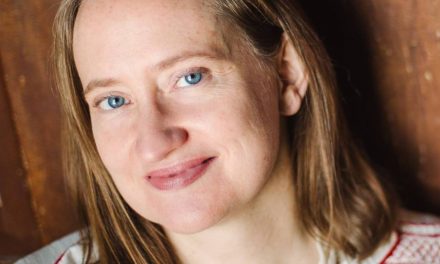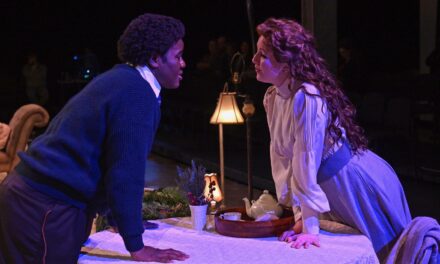Composer Joaquín Rodrigo
Music Without Borders: Concierto de Aranjuez
Louisville Orchestra
Kalena Bovell, conductor
Stephen Mattingly, guitarist
A review by Annette Skaggs
Entire contents are copyright © 2022 by Annette Skaggs. All rights reserved.
One of the many programs that the Louisville Orchestra presents each year is the Music Without Borders series, wherein the Orchestra goes out into the community to present their concerts. In this go-around, the locations chosen were The Temple, The Jeffersonian, and the Paul W. Ogle Center at IUS. The series is rather successful in engaging audiences where they live.
Fresh off the triumphant Festival of Latin American Music series, this Music Without Borders concert featured three pieces with Latin pedigrees.
Under the baton of guest conductor Kalena Bovell, the evening began with Georges Bizet’s Suite No. 1 from the opera, Carmen. This suite contains some of the most recognized notes in music today, frequently used in movies and television, yet I always hear something new every time. This evening’s performance certainly did not disappoint.
Written in five movements, the Prelude and Aragonaise has a heavy string presence, followed by a beautiful duet with flute and harp that begins the Intermezzo. The danceable Seguedille comes to life with the help of trumpet blasts that lead us to Les Dragons d’Alcala and the ever-flavorful Les Toréadors. While I am sure many in the audience anticipated the opening of the finale, at least one person jumped six feet in the air with the huge exposition of horns that announce the arrival of our hero bullfighter, Escamillo.
I’d also like to thank one of the clarinetists who entertained me throughout the Suite as I watched him bob his head and pretty much dance in his seat throughout the whole of the piece. I love seeing a musician so caught up in their playing.
If you have been privy to the works that had been performed in the aforementioned festival, you would have heard works that were written as homage to or influenced by cities, mountains, or communities in which the composer lived or worked nearby. The second selection of the evening was a strong example of this notion.
Spanish composer Joaquín Rodrigo’s composition Concierto de Aranjuez was inspired by a palace in Aranjuez, which is near Madrid. Surrounded by opulent gardens, the Palacio Real became THE place for royalty to “get away” in the springtime when the gardens were at their loveliest. While the gardens represent beauty and tranquility, the concerto reflects the composer’s feelings regarding the Spanish Civil War that was being fought while he studied in Paris in the 1930s.
Written in three movements, Aranjuez gives its listener a direct sense of the beauty of this palace and those who reside and take care of its grandeur. Written as a guitar concerto, it is one that is part of the orchestral canon of the 20th and 21st centuries. So, with such a gorgeous composition you need a talented guitarist. Lucky for us we had Stephen Mattingly, who serves as an Associate Professor of Music at the University of Louisville and has performed near and far; Carnegie Hall and Finland for example, exhibiting his prowess for guitar playing.
Allegro con spirito certainly lives up to its title, setting the tone for the whole piece with the orchestra serving the theme and the guitar providing seemingly improvisational accompaniment. While this section has a lightness to it, the second movement, Adagio, is a bit heavy. An English horn joins the guitar telling a story of reflection that is then joined by the orchestra that continues to follow the emotional foundation of the beginning of the movement. Ms. Bovell shared that Mr. Rodrigo’s wife had stated that the second movement was a lament and musical catharsis after she and her husband suffer a miscarriage. An artist’s heart and soul are certainly on display in this movement. The Allegro gentile returns to a feel-good sound, so much so that it has a bit of a nursery rhyme sound in its delivery. It certainly has the classical structure of the first movement, with a nod to Bach. The richness of Mr. Mattingly’s playing added many layers of sound and musicality to such an emotionally rich and complex composition.
Closing the evening we are treated to Argentinian Alberto Ginastera’s Variaciones concertantes, Op. 23. While some would think that 12 movements would be a bit of an overkill, this piece certainly knows how to keep them all succinct and essential. The first movement, Tema per Violincello ed Arpa, led by the cello and harp, set the theme for the following movements to follow with their variations. Throughout the concerto, we hear variations from almost every instrument in the orchestra: flute, clarinet, viola, oboe, trombone, horns, contrabass, and of course, violins. If I missed anyone, I apologize. While the instruments take their turns in the limelight, the orchestra does well in the balance of sound and direction.
While the composer himself said that he didn’t write the piece with the intent of sounding overly Argentinian, he borrows from folk songs and adds character by emulating the sounds of nature. In the finale, Rondo, the orchestra unleashes a fervor of unbridled music and excitement, ending triumphantly.
A successful and fun conclusion to the Festival and a great introduction to new to me Latin music. Can’t wait to hear more!
Bravi Tutti!!
Music Without Borders: Concierto de Aranjuez
March 25, 2022
Louisville Orchestra
The Jeffersonian
10617 Taylorsville Road
Louisville, KY 40299
Louisvilleorchestra.org
Annette Skaggs is heavily involved as an Arts Advocate here in Louisville. She is a freelance professional opera singer who has performed throughout Europe and in St. Louis, Cincinnati, Boulder, Little Rock, Peoria, Chicago, New York and of course Louisville. Aside from her singing career, she has been a production assistant for Kentucky Opera, New York City Opera, and Northwestern University. Her knowledge and expertise have developed over the course of 25+ years’ experience in the classical arts.





